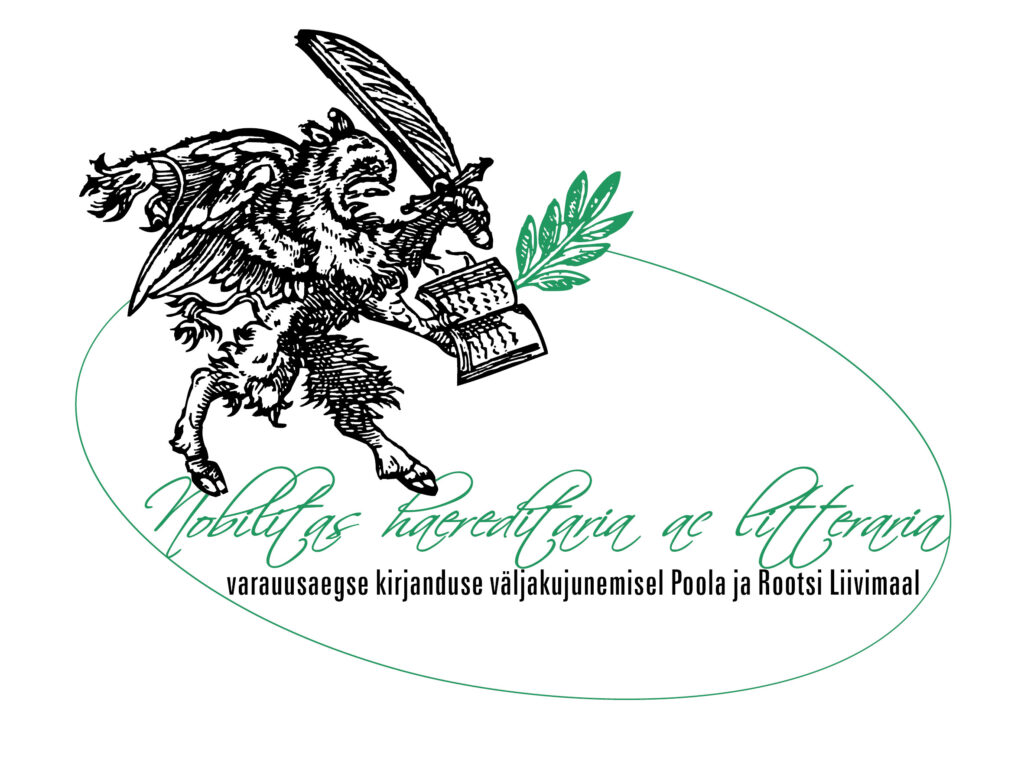Connections, transition, change: nobilitas haereditaria ac litteraria in the emergence of early modern literature in Polish and Swedish Livonia
Personal Research Funding Project PRG1926 (2023–2027)
The project shows that the increasing interest in literary production of the Baltic German nobility in the 18th-19th c. Was not based mainly on the appropriation of creative practice by the nobilitas haereditaria, but instead on the massive ennoblement of scholarly authors and families (nobilitas litteraria) during the 16th–17th c. In such a way, we re-evaluate the thesis of the literary awakening of the nobles as a result of favorable political, economic, legal developments. As part of the Polish-Lithuanian Commonwealth (Livonia 1561–1629) and the Swedish Empire (Estonia 1561–1710, Livonia 1629–1710) boundaries of social strata enabled mixing and upgrading. The conceptual shift in the treatment of the nobility- literature relationship will be recorded in a collective handbook “Adel und Literatur in den frühneuzeitlichen baltischen Landen”, and in source publications of important literary works still in manuscript (Lode-Werner, Wrangell, Meyer, Mengden, Hilchen, Schwembler).
Principal investigator
- Kristi Viiding, PhD (Neo-Latin Studies; Classical Philology; Estonian Language and Literature)
Senior research staff
- Martin Klöker, PhD (German literature; Literary history; Book History)
- Maria-Kristiina Lotman, PhD (Classical Philology; Versification)
- Kaarel Vanamölder, PhD (Early Modern History and Historiography; Communication History)
- Aira Võsa, PhD (Theology; History; Book History)
Other Research staff
- Marin Jänes, MA (German literature and cultures)
Reference Group
- Alicja Bielak, PhD (Polish Academy of Sciences)
- Enn Küng, PhD (Tartu University)
- Ulrike Plath, PhD (Tallinn University)
- Kristiina Savin, PhD (Lund University)
Hypothesis and goals
The main aim of this project is to make the broader research community aware of the current research gap in the study of the literature of the Estonian and Livonian nobility in its first centuries (16th–17th centuries) and to fill it with unbiased, scientific, and interdisciplinary well-founded case studies, critical and commented editions of key texts and a handbook based on a solid bibliography. The project seeks a critical revision of the current approach to the Baltic German literature.
The project is based on the hypothesis that the emergence of the writing nobility in Estonia and Livonia was not only caused by a rapid improvement in the economic, political and legal situation of the nobility at the end of the 18th century, but by a sociocultural, educational and literary change that had already occurred in the Early Modern times, in the following stages:
- the widespread ennoblement of the scholars and officials and their descendants in the 16th–17th century;
- the mixing of intellectuals under Polish-Lithuanian and Swedish rule with the old Baltic-German nobility;
- the transfer of the literary and scholarly ideals and competence of the intellectuals to the old
nobility.
With this, we do not plan to analyze the results of the change, i.e literature created by the nobility in the 18.–19 century, but rather the preceding early literary situation.
Contrary to Wilpert’s (2005) thesis that „Baltic German literature was carried by nobles and writers, whose separation became blurred as a result of increasing exchanges – nobles becoming writers and writers being ennobled“ („die baltische Literatur wurde getragen von Adligen und Literaten, deren Trennung durch zunehmenden Austausch – indem Adlige Schriftsteller, Schriftsteller geadelt wurden – verwischte“), we assume that:
- the interaction was not a diffuse phenomenon in Early Modern times, but took place in one direction: after the rise of authors to nobility, their mixing with the old nobility through marriages gradually, over several generations, influenced the high nobility as a whole towards literary practices.
- precisely the slow but accumulating ennoblement ensured the sustainability of literary change for the next centuries.
As the Baltic German nobility maintained its writing culture until the end of its existence in the 20th century and became, in Estonian literature – among other interpretive possibilities – a symbol of educated influential social strata interested in literature, research on this concept is crucial for the study of later Estonian literature.

